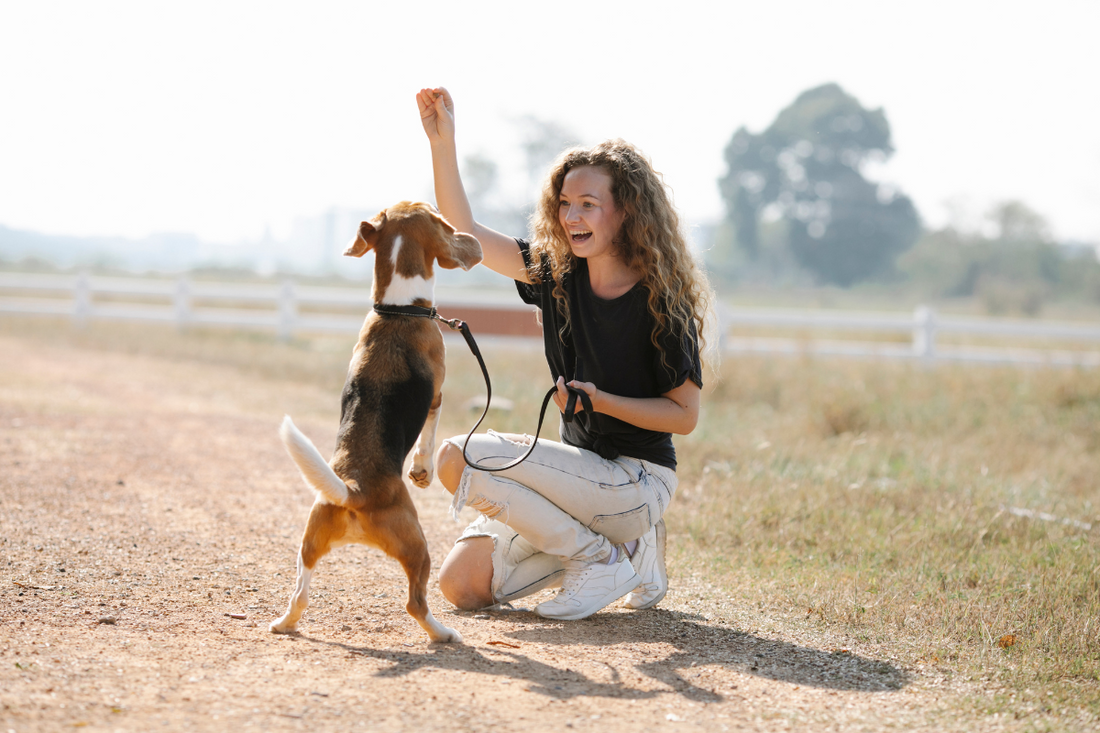
Rethinking Power, Purpose, and Partnership in Canine Care
There was a post in a Facebook group recently. It read:
“For those with agility/fly ball dogs — when the girls have been in season, how do you help them return to full power and speed while avoiding that flat, one-paced period? Are there any supplements that I can add to help my girls recover quicker?”
We’re not here to shame the question. It’s valid, and it's coming from someone who clearly cares about their dog.
But it does raise something worth slowing down for.
Because beneath this question “how do I get my dog back to full power?”, sits a deeper one:
Who is the speed for?
What does “power” mean in this context?
And why are we so uncomfortable with natural rhythms, especially the ones that slow things down?
Dogs Are Not Machines
We live in a culture that prizes productivity, performance, and perpetual output and it’s easy to see how those values leak into our relationships with animals, too.
Whether it's agility training, obedience work, or even emotional support roles, we often place expectations on our dogs that reflect our human timelines, not their biological or emotional truth.
In this worldview, dogs are asked to:
Perform
Obey
Fit neatly into our lives
Recover quickly
Get better soon
Stop doing that
What happens when they can’t?
Or more importantly, when they don’t want to?
From Compliance to Collaboration
The traditional narrative says we live with dogs but often, we live through them. They become an extension of our identity. A reflection of how “good” we are. Or how much control we have.
But what if we’re missing the point?
What if dogs are not here to comply, fix, or please us?
What if they are here, like all wise, attuned beings to reflect, disrupt, and reveal?
This is the space where shadow work begins: not in fixing our dogs, but in becoming curious about what their “difficult” behaviours awaken in us.
When they refuse a walk, what does that awaken in our own discomfort with stillness?
When they bark uncontrollably, is it about noise or our need for emotional containment?
When they’re "flat" or withdrawn, are they out of sync or are we?
Rethinking Roles: Emotional Support or Emotional Suppression?
We talk often about dogs as emotional support animals and of course, the bond is real. But there’s a fine line between companionship and co-dependence.
When our dogs are expected to constantly regulate us, offer affection on demand, or be a reliable buffer for our nervous system, the question becomes:
Are they supporting us…
…or are they carrying us?
This isn’t a moral judgment. It’s an invitation to notice the asymmetry.
Not to stop loving our dogs. But to start recognising them as sentient collaborators, not service providers.
But What About “Enrichment”?
Enrichment is a word that gets thrown around a lot in modern dog care. And yes, dogs thrive when their needs for movement, stimulation, and purpose are met.
But enrichment, too, has been co-opted by the performance paradigm.
Flyball. Agility. Obedience competitions. "Working dog" outlets.
Are they all bad? No. Some dogs clearly enjoy the structure and energy of these activities.
But we have to ask:
Who is the activity for?
Is it really meeting the dog’s intrinsic need or our extrinsic desire?
What would it look like to let the dog choose?
Because contrary to what many “breed-specific” books say, not all collies want to herd. Not all terriers want to dig. Not all retrievers want to retrieve.
What does your dog want?
Have you asked?
Let’s Talk About Power
This brings us back to that Facebook post.
The discomfort with a “flat” dog one who isn’t ready to return to peak performance after a hormonal cycle tells us more about our culture than it does about the dog.
A dog who is flat after being in season is not malfunctioning.
She is moving with the rhythm of her body. She is in process.
So, the question isn’t “how can I speed this up?”
It’s:
Can I sit with the slow?
Can I let her be sovereign in her cycle?
Can I trust that rest is not regression?
A Shift in Perspective
If this is resonating, we’d love to introduce you to a powerful framework: The Compliance to Partnership Planet Model for Living with Dogs by Maya Badham.
Maya outlines three distinct “planets” that shape how we live and work with dogs:
Compliance Planet – where obedience, control, and performance are the focus, often at the expense of the dog’s needs.
Partnership Planet – rooted in empathy, mutual respect, and deep listening; it’s about co-creating life with our dogs, not simply managing them.
Extended Partnership Planet – This space allows us to reflect on where our beliefs have come from and begin shifting our perspective, without blame or defensiveness.
This isn’t about judgment. It’s about awareness.
And this model offers a map not to perfection, but to a deeper kind of connection. One that honours both the human and the dog as full participants in the relationship.
Read Maya Badham’s The Compliance to Partnership Planet Model for Living with Dogs here.
That’s the heart of the FETCH framework, too:
🌿 Fresh Food
🌿 Energetics
🌿 Targeted Approaches
🌿 Curiosity
🌿 Holistic Health
FETCH isn’t just about care protocols it’s about how we see, hear, and honour our dogs as sovereign beings.
Not as tools to fulfil our needs.
Not as projects to fix.
But as sensitive, intelligent partners navigating a human-shaped world beside us.
We don’t always get it right. But we can keep asking better questions.
And if something stirred while reading, a pause, a question, a “hmm”, we’d love to hear it. Comment below. We're listening.
Dr Alexia Mellor & Stacey Renphrey - FETCH Founders
